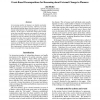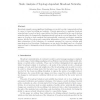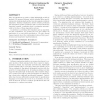490 search results - page 80 / 98 » Formal Action Semantics for a UML Action Language |
ATAL
2003
Springer
13 years 11 months ago
2003
Springer
What distinguishes e-commerce from ordinary commerce? What distinguishes it from distributed computation? In this paper we propose a performative theory of e-commerce, drawing on ...
CORR
2009
Springer
13 years 5 months ago
2009
Springer
Transactional events (TE) are an extension of Concurrent ML (CML), a programming model for synchronous message-passing. Prior work has focused on TE's formal semantics and it...
AIPS
1996
13 years 9 months ago
1996
An increasing number of planners can handle uncertainty in the domain or in action outcomes. However, less work has addressed building plans when the planner's world can chan...
IANDC
2010
13 years 6 months ago
2010
Broadcast semantics poses significant challenges over point-to-point communication when it comes to formal modelling and analysis. Current approaches to analysing broadcast netwo...
SIGSOFT
2008
ACM
14 years 8 months ago
2008
ACM
Alloy specifications are used to define lightweight models of systems. We present Alchemy, which compiles Alloy specifications into implementations that execute against persistent...



